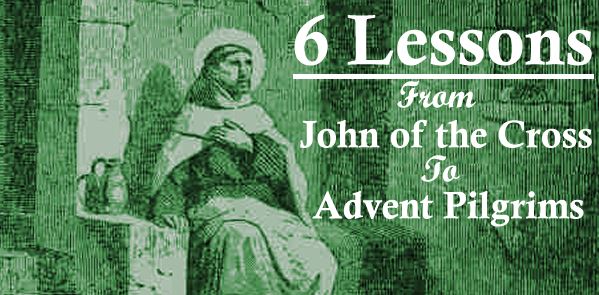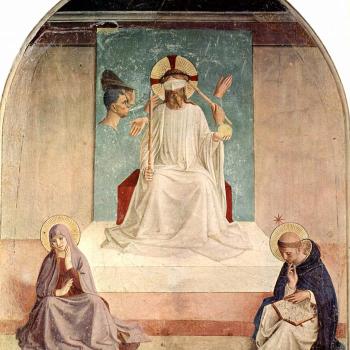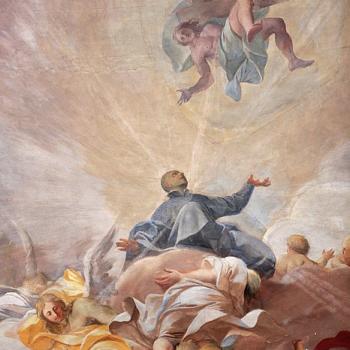 Advent is a season that the christian church has historically used as a time to examine itself, to undergo fasts, and to take time to seek greater union with God. It is rooted in the belief in a radical hope, in spite of a life fulled with trials. There are few guides that I have found more wise and valuable in understanding these values of Advent then Saint John of the Cross. His work is profoundly powerful and also sheds a great deal of light on the profitability of those times that we today often describe as dry, or “wilderness experiences”. St. John of the Cross’ wisdom on this is most clearly seen in his classic work The Dark Night of the Soul. Much of what St. John of the Cross has to say resonates strongly with me. I do not feel as if, at this point in my life, God has allowed me to undergo a purgation of the soul as deep and dark as what John expounds upon in much of the work, however as when I read though the book I confess I am deeply convicted of my own fallenness and need of sanctification on the deepest levels. The journey of life is filled with hardships, and sometimes when we look around at the brokenness of the world, and the fallen people who make up the church we lose our hope in what God is doing. It is out of this pain that our Advent hope in Christ’s coming is rooted. If anyone knew this struggle it was John of the Cross. He was raised in a family that had been disinherited, and lived in poverty after his father died. His efforts to bring reform to his monastic order got him tortured and imprisoned by his fellow monks. Yet John was able to see the work of God in the midst of darkness both outwardly and inwardly. His words still contain many messages I think we can all learn from. Here are six affirmations that John can help us remember in this time of Advent.
Advent is a season that the christian church has historically used as a time to examine itself, to undergo fasts, and to take time to seek greater union with God. It is rooted in the belief in a radical hope, in spite of a life fulled with trials. There are few guides that I have found more wise and valuable in understanding these values of Advent then Saint John of the Cross. His work is profoundly powerful and also sheds a great deal of light on the profitability of those times that we today often describe as dry, or “wilderness experiences”. St. John of the Cross’ wisdom on this is most clearly seen in his classic work The Dark Night of the Soul. Much of what St. John of the Cross has to say resonates strongly with me. I do not feel as if, at this point in my life, God has allowed me to undergo a purgation of the soul as deep and dark as what John expounds upon in much of the work, however as when I read though the book I confess I am deeply convicted of my own fallenness and need of sanctification on the deepest levels. The journey of life is filled with hardships, and sometimes when we look around at the brokenness of the world, and the fallen people who make up the church we lose our hope in what God is doing. It is out of this pain that our Advent hope in Christ’s coming is rooted. If anyone knew this struggle it was John of the Cross. He was raised in a family that had been disinherited, and lived in poverty after his father died. His efforts to bring reform to his monastic order got him tortured and imprisoned by his fellow monks. Yet John was able to see the work of God in the midst of darkness both outwardly and inwardly. His words still contain many messages I think we can all learn from. Here are six affirmations that John can help us remember in this time of Advent.
1) God is the master and guide. Our relationship with God is just as vulnerable to our own sinfulness as any other relationship. The first part of The Dark Night of the Soul makes this clear as St. John evaluates how each of the seven deadly sins can be seen even within our own spiritual life and practices. If we are relying on our own spiritual disciplines to bring us closer to God we are forgetting who is ultimately responsible for the work. St. John of the Cross describes near the end of the book the ways in which God clothes us and prepares us himself for union with him. It is not our natural intelligence, our memories, or our will that can unite us with God, for according to John, these are only temporal and are to be overcome by the virtues that God provides: faith, hope, and love respectively. As John writes:
If thou wilt, oh soul, unite and wed with me, thou must come clothed interiorly with Faith….
2) The focus of our lives should be more on loving God then theological complexity. This is a lesson I need. Although, there are indeed great works of theology both within the scope of the Canon of scripture, and within the riches of christian tradition, it is easy to get caught up in a quest to understand God in all the right ways. John of the Cross offers a valuable reminder that these things in themselves do not give us a love for God, or a union with him. Love of God should be our aim. Our love for god is rooted deeper then our will or intellect it is planted in our soul. It is good to know and desire God; but our chief aim must be to love God. John Writes:
although [the pilgrim] walks, unstayed by any special interior mental light, or exterior guide, to sustain and encourage her on this lofty road, since the darkness of this night deprives her of all such aid ; still her Love and Faith which ever, like a beacon lights her way, and constantly importune her
3) God is bigger than we see. There is much more of God then either you or I can know. God transcends every method of categorisation. It comes with the territory of being (and allow me to categorize for a moment) an all powerful spirit outside of space and time. We have to be wary of letting our ideas of God become walls that block us from from drawing near to him. How we feel about God can keep us away from him. John of the Cross uses a vocabulary to describe God which is not dialectical but more pictorial. The things of God are beyond words but we can explain them, to a degree, with natural things. John of the Cross describes the wood burning as a metaphor for the difficulty our soul must go through to achieve the light of God. He also meditates upon the way light is better seen in when reflecting off dusty air then when the air is clean, this operates a similitude to show us how much darker our soul seems when seen in the light of God. In this way John reflects on many things. His preferential tendency to quote the prophets and the books of poetry over the Torah or the epistles is certainly marked. This seems to demonstrate John follows in Evagrius Ponticus’ view of theology. Namely, “The theologian is the one who prays truly, and on who prays truly is a theologian.” In this way we see the value of being led into a knowledge of God by God himself, for his is the only testimony that speaks from a true perspicacity.
4) Do not get caught in seeking God only in the ways you have known him in the past. There are times in our faith where things seem dry and perhaps even lifeless. The natural tendency of many is to go back to what has worked before, simply because it is what has worked before. Saint john of the Cross likens this to a man who leaves a building only to enter it again. He compares us to children who are weaned from the breast so that we might partake in solid food. This process is indeed dark and painful to the child, and so it it is with us. John of the Cross recommends we allow God to transform our spiritual practices as he transforms our state with him. Instead of viewing times of comfort in our prayer life as a sign that we have pleased God through what we have done, John recommends we look at them a time to see all that God has done to work his own light in our hearts just as a refiner or blacksmith removes a metal from the scorching flames to survey the work of his hands. Comfort is not a sign of accomplishment any more then difficulty is a sign of failure. Let both the sweetness and the hardship of the christian life assure you that God is carrying out his good work in your life.
5) Stay connected to the people of faith who have come before you. As our spiritual life grows difficult it is important to converse with those who have gone before through troubles and tribulations. The most cursory glance and the scriptures will show that being called by God is not always a really nice thing for the one who is called. St. John of the cross guides us through the lives and prayers of many people of God who have suffered in their journey to follow God. We see the cries of David, Jeremiah, Job, and many others. It is these lives and prayers I find solace and an assurance that if a hero of faith can cry out “the pains of hell surrounded me.” (Psalm 18:5) I can find assurance of God’s sanctifying work in my life in the midst of despair.
6) No matter how you feel, God has not thrown you away. The strongest current we can recognize in The Dark night of the Soul is that suffering is one of the ways that God draws us to himself. He desires to make us holy and humble. Even if that means that for times in our life we are not happy. The humility God seeks to work in us is not achieved by the building up of good things, but in seeing that in our own strength our lives are immersed in evils. It is because our sin is so deep that God allows us to go through the “grave and piteous griefs” and the feelings that God has forsaken us. The struggles we often associate with a lost of our spiritual unity with God are often times the means that God helps us grow into a greater union with him. According to John, our sensuality is purified by aridity, our faculties made holy through an emptiness of perceptions, and our spirit is cleansed in darkness. It is important to remember through it all that God loves you deeply and is working in you though all these things. It is not our greatness that God uses and works with, but our smallness. John writes:
To be taken with love for a soul, God does not look on its greatness, but the greatness of its humility.
As we continue through this season of Advent my prayer is that I might have the wisdom to see the work of God not just in joys of my walk with him, but also in the death we are baptized into. The season of Advent itself exists in great part because followers of Jesus recognized the need for a hope beyond their circumstances. It may not be a time of gratification, but I do feel it is a great season for cultivation, and one in which I am glad to have John of the Cross as a consort.












